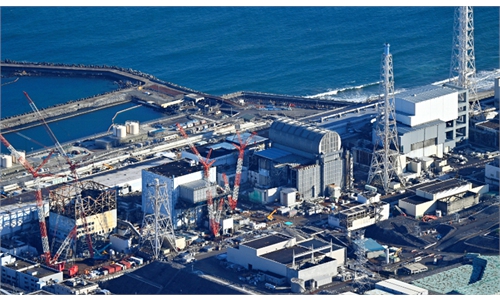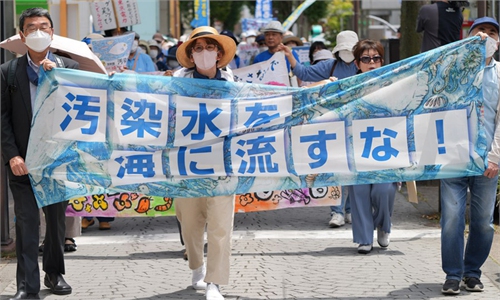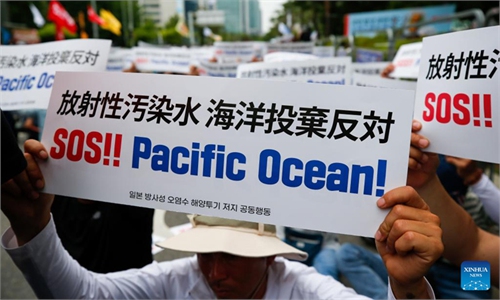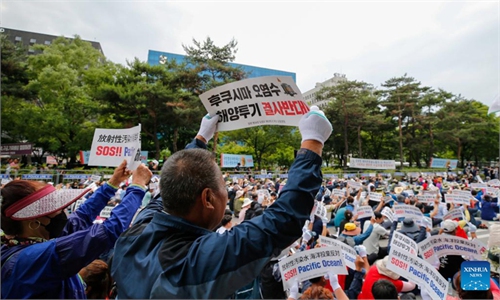GT survey: Over 80% of respondents think Japan's nuclear-contaminated water dump plan 'irresponsible'
Countries urged to keep vigilant against Japan seeking endorsement from IAEA to advance dumping plan
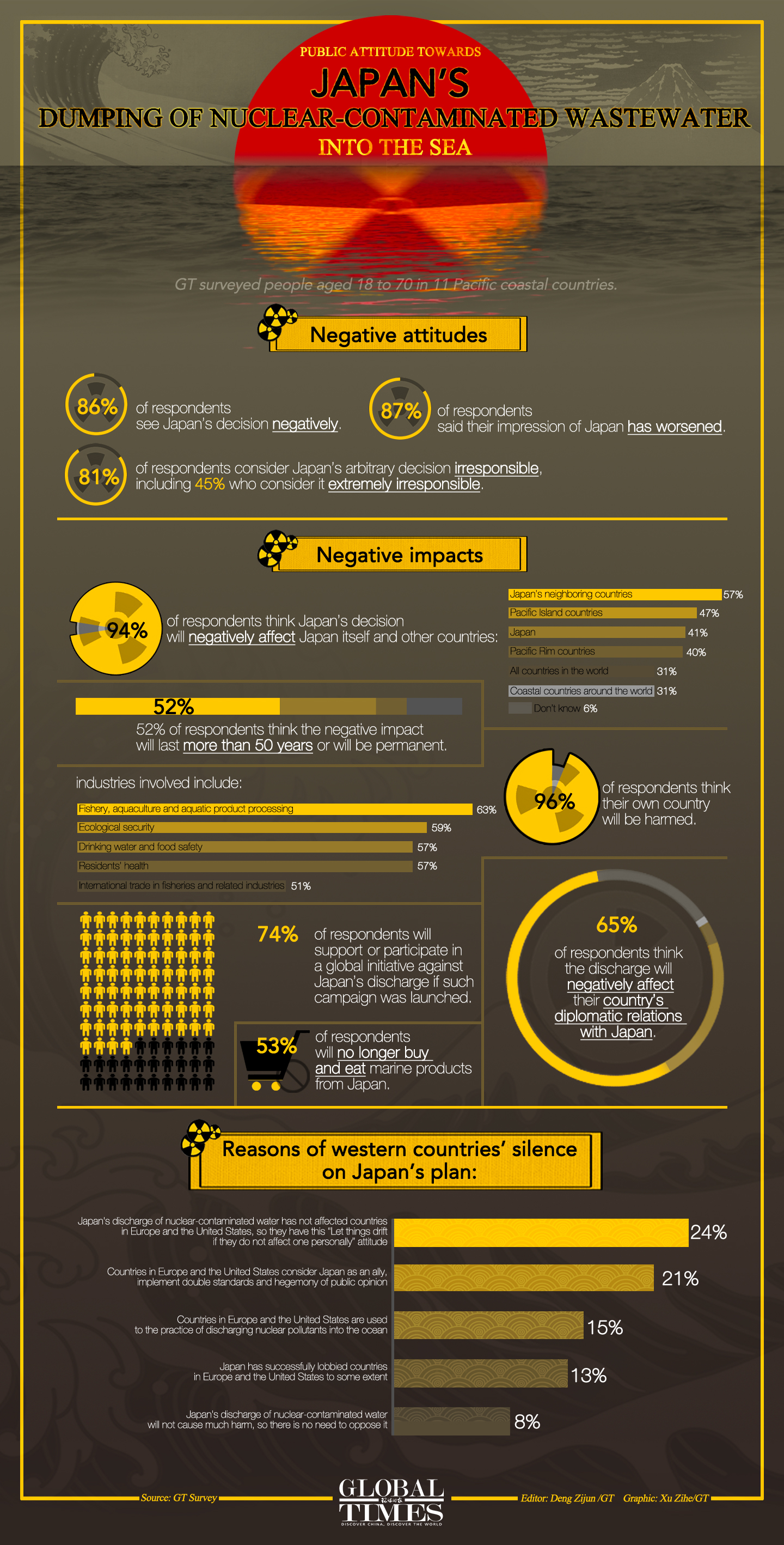
Graphic: Xu Zihe/GT
The survey result is released as the Director General of the International Atomic Energy Agency (IAEA) Rafael Mariano Grossi is scheduled to start a visit to Japan from Tuesday to Friday and see the Fukushima Daiichi nuclear power plant while the organization is called to fulfill its responsibilities and respond to media reports which claimed that Japanese officials imposed inappropriate influence on the IAEA comprehensive review report by making political donations. Meanwhile, more countries and experts are voicing increasing concerns over Japan's plan to dump nuclear-contaminated water from Tokyo Electric Power Co's Fukushima plant into the ocean.
Analysts said the international community should also keep vigilant to the IAEA possibly offering "green light" to Japan's irresponsible dumping plan as the Pacific Ocean is not a trash can for Japan and all stakeholders should work together to urge the Japanese government to stop implementing the wrong plan and prevent Fukushima from becoming "the Chernobyl of the sea."
Increasing worries
Since June, the Global Times Research Center conducted a survey in 11 countries - China, South Korea, Japan, the Philippines, Malaysia, Thailand, Singapore, Indonesia, Vietnam, Australia and New Zealand to learn about the public attitude toward Japan's discharge of nuclear-contaminated water into the Pacific Ocean. The survey received 11,633 samples from respondents aged from 18 to 70.
The questionnaire included 22 questions to understand respondents' knowledge and attitude toward Japan's dumping plan, the influence made by the plan, measures that Asia-Pacific nations can take to respond to it and the US and European countries' attitude on the plan.
The survey found that over 60 percent respondents knew about the 9.0-magnitude earthquake in Japan in March 2011 and the following tsunami and nearly 50 percent of them knew the Fukushima Daiichi accident, which produced millions of tons of nuclear-contaminated water. Respondents from China, Japan, South Korea and Singapore have a better understanding of the nuclear-contaminated water; while awareness rate in other five Southeast Asia countries, Australia and New Zealand is around 20 to 30 percent.
A total of 86 percent of the respondents expressed a negative attitude toward Japan's dumping plan with 56 percent of them choosing "worried," 44 percent opting "shocked," and 38 percent said they were "scared" and "angry." 98 percent of Chinese respondents and over 90 percent of respondents in South Korea held negative view toward Japan's decision, ranking the top among the 11 countries. While in Japan, aside from expressing worries and fear over the dumping plan, nearly 30 Japanese respondents used "complicated" to express their attitude.
The Japanese government attempted to seek endorsement from the IAEA and the Group of Seven (G7) nations at the Hiroshima summit in April but it has neglected the voice from the people. Once the nuclear-contaminated water is discharged into the ocean, it will cause irreversible influence to people in neighboring countries and global ecological system, Lü Yaodong, director of the Institute of Japanese Studies at the Chinese Academy of Social Sciences, told the Global Times.
The latest survey fully showed the concerns of people in related countries and the Japanese government must pay attention to it, Lü said. However, the Japanese government broke its previous promise of getting understanding from all stakeholders before taking actions, nor has it revoked the dumping decision, casting aside people's concerns and prompting opposition of local fisheries and industries.
Except for Japan, more than 80 percent of the respondents in the other 10 countries said Japan's dumping plan is "irresponsible" and 76 percent of people in China, 59 percent in South Korea and 52 percent in New Zealand said Japan's move is "extremely irresponsible."
Over 80 percent of the respondents from the 10 countries said they "strongly oppose" or "oppose" Japan's dumping nuclear-contaminated water into the Pacific Ocean; 76 percent of Chinese respondents, 64 percent in South Korea, 53 percent in New Zealand, and 49 percent in Australia chose "strongly oppose."
The survey showed that 94 percent of the respondents thought Japan and other countries would be negatively affected by Japan's dumping plan and 57 percent of them deemed Japan's neighboring countries would suffer the most and 43 percent of people in South Korea thought countries around the world would be affected.
Among the industries listed in the questionnaires, fishery and aquaculture, seafood catering industry, aquatic product processing are among the top three that were thought by respondents as "mostly affected industries" by Japan's discharge plan. And 54 percent of them also thought the plan would also hit costal tourism.
The survey showed Asian-Pacific countries expressed opposition to Japan's dumping plan, the majority of the international community who have conscientiousness would also not agree with Japanese government's dumping plan. However, the intensified geopolitics has distracted people's attention and the Japanese government is also fanning flames for the tensed situation to create conditions to push for its dumping plan, Jin Ying, a research fellow from the Institute of Japanese Studies at the Chinese Academy of Social Sciences, told the Global Times.
"The Pacific Ocean is not the trash can of Japan and the dumping plan relates to all humans. It's not Japan's private affair," said the expert.
Taking measures
The survey also found that most respondents agreed their countries should take measures in dealing with Japan's dumping plan. Except for Japanese respondents, 42 percent of the respondents in other 10 countries preferred to "seek solutions of international consensus through international organizations such as the United Nations," 37 percent of them chose to "tighten the import control measures of aquatic products from relevant regions," and more than 30 percent of them agreed to "send international scientific expedition vessels to inspect, monitor and supervise surrounding areas.
A total of 29 percent of the respondents supported the idea that other countries should "unite to boycott the irresponsible behavior of the Japanese government."
Chang Yen-chiang, director of the Yellow Sea and Bohai Sea Research Institute of Dalian Maritime University, who has paid close attention to Japan's actions on the nuclear-contaminated water, said that the international community can take combined measures, for example, making proposals at the UN and urged the International Court of Justice to assess whether Japan's dumping plan violates any international laws.
Measures mentioned in the survey are all practical and combining these measures would help impose pressure on the Japanese government, said Chang.
The Japanese government's determination to implement the dumping plan will affect the interests of all humans and Japan would be condemned in human history, said Lü, calling on more countries to urge Japan to correct its wrong decisions.
The survey also included questions related to the IAEA with nearly 40 percent of the respondents doubting the organization can remain neutral and reliable in dealing with Japan's discharge of Fukushima nuclear-contaminated water into the sea. People in China and South Korea gave the lowest trust rate.
As Japan gets closer to releasing the Fukushima nuclear-contaminated water into the sea, South Korean media on June 21 revealed that the Japanese government has made a political donation of more than 1 million euros ($1.10 million) to the IAEA in order to resolve differences of opinion between the IAEA and third country experts conducting a review of the nuclear-contaminated water from the Fukushima Daiichi Nuclear Power Plant.
Some people may think reports from the IAEA could prove the safety of Japan's dump plan, but that's not true. What the Japanese government is doing is to find endorsement from the IAEA, which would strike a blow to the organization's credibility in dealing with nuclear emergencies, said Jin.
All parties should keep vigilant against the Japanese government's move taking advantage of the IAEA and avoid making the Fukushima 'the Chernobyl of the sea,'" said the expert.
